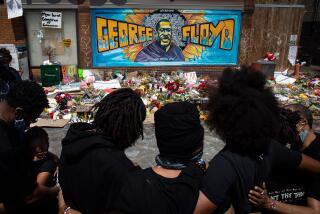A YEAR AFTER
- Share via
After other American tragedies the standard question was, “Do you remember where you were?”
After Sept. 11 the better question is, “Do you remember who you were?”
A year later, we’re wholly transformed. Not just changed or challenged, but remade as a nation on a molecular level, since a nation’s molecules are its hearts and minds.
Cynics have been carping lately that nothing has changed, that everything has gone back to normal. But if things have regained a surface normality, that doesn’t mean we’re the same. It means we’re surviving.
Normality is cause for celebration. When we laugh at something silly or obsess about the trivial--Martha Stewart or baseball salaries--it’s a triumph of the human spirit. We’re forging ahead, despite how different we are, despite the fear we feel and the things we can’t forget.
We’re more different than we know, more different than we dare to admit, and it may take a generation to understand how. A year isn’t enough time, especially this year, which felt like one long day. It took months to excavate the site of the World Trade Center--it could take a lifetime to quarry its meaning and consequences.
This American tragedy stands apart, affects us differently than others, partly because it was the first tragedy that America witnessed, live. Gettysburg, Antietam, Pearl Harbor, Normandy, Oklahoma City--the most violent moments in American history weren’t seen by most Americans. We saw only their immediate aftermath. We saw the dead, but we didn’t watch them die. Pictures of carnage, accounts of survivors, these were always subject to the sanitizing limits of language and time.
The mystic cords of memory were never plugged into live TV cameras.
Until Sept. 11. On that day we saw the unreal, in real time. We saw the second plane pierce the tower, saw the towers crumble, saw death as it happened, in a moment of national awe, a communal witnessing that welded us together in a new way.
Only recently has such a mass witnessing been possible. Only in the video and digital age could the searing images of Sept. 11 have become an instant and simultaneous part of the collective unconscious of America. We grieve as much for those who died in the Pentagon and Pennsylvania, but if we picture the World Trade Center first when we think of Sept. 11, it’s because we were all there, in Lower Manhattan, via satellite.
The hijackers wanted us to watch. They were counting on huge ratings. But they misjudged their audience. They meant to sow terror, and instead sowed horror, which is something different. Terror is raw fear. Horror is fear with revulsion. Terror causes panic. Horror prompts action, because revulsion brings resolve.
By gluing us to our TV sets, the terrorists inadvertently glued us to one another. They fused our hearts, and fates, and gave us a new common denominator as a nation.
After the images came the voices. In the days and weeks following the attacks, we listened to those heart-rending recordings--radio communications among out-of-breath rescuers, answering machine messages from trapped workers. I love you. Take care of yourself. Goodbye.
We try to quiet the echoes of those voices. Some days we can’t. Memory is our other new enemy. The tragedy hijacks our train of thought. We close our eyes and hear. We look at a bright blue autumn sky and see the towers give way, again and again and again. We see those men and women at the windows, yelling for help, waving shirts, leaping. We think of how it must have felt, to fall.
The memory of Sept. 11 is so large, so powerful, it alters memories that predate it. We look at old magazines and newspapers, and they seem death-shadowed and moot. We look at photos of ourselves from a few years ago and wonder--Who was that? We look at pictures of the towers when they were pristine, glittering in the twilight, and we don’t see them as cloud-topped anymore, but cross-haired. They look in hindsight like two 110-story tombstones, like giant portents signaling the date of their own destruction--11.
We haven’t had time this year to explore and discover all the ways we’re different, because we’ve been busy collecting information. Hard facts have been hard to come by. We still don’t know the exact number of dead, and we may never. We still don’t know the motive of the terrorists. Did they hope to rule the world or just to ruin it?
We still can’t imagine what comes next. Sept. 11 will either be remembered as the start of the terrorists’ war on us, or the start of our war on terrorism.
We don’t know what lurks around the corner, and until we do, we won’t be able to process the corner we’ve just turned. We live suddenly in an age of unknowing--fighting an enemy we can’t see, whose mind we can’t fathom, putting our faith in secret agents we’ll never meet.
Until there is a turning point, a decisive moment, meaning will be among the missing. And without meaning, without facts and answers and some historical context, what should we do on this anniversary? What can we do, but witness again, relive our common experience, retell the stories of those who died--then retell ours?
This may be the form that countless informal observances take today. When we meet in coffee shops and bars, at work and at dinner, we will describe what we saw and heard and can’t forget, to people who saw and heard and can’t forget the same things.
It’s not redundant. It’s a new dialect, a cultural shorthand, a therapeutic exchange of images and voices and grief. It’s the story we can’t stop telling, the day we can’t stop living.
This is who we are now, a year away from who we were.


